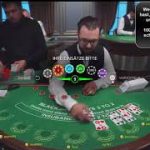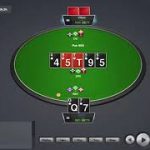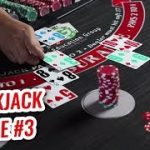Texas Holdem Strategy Video Source & Information:
In poker, pot odds are the ratio of the current size of the pot to the cost of a contemplated call. Pot odds are often compared to the probability of winning a hand with a future card in order to estimate the call’s expected value. My reader struggles with understanding and calculating pot odds. Could you help? Then, once you do the math, what is your move here?
—-
Poker is your thing? Ready to move up in limits? Want the tools to challenge a bigger game? A Cash game strategy that works? Check out my new ebook – http://bit.ly/4StepPoker
—
Have questions about poker and lifestyle? Or want your hand reviewed on the Hand of the Day? Leave a comment, don’t forget to like and subscribe!
Subscribe to my blog and get in touch. I’ll respond with a video! http://www.alectorelli.com
Facebook: https://www.facebook.com/alec.torelli
Twitter: https://twitter.com/AlecTorelli
Instagram: http://www.instagram.com/alecandambra
Snapchat: AlecTorelli
Source: YouTube








Hi Ron my two cent view, you play your draw too passive, since you want to draw passively no choice you have to call, villain range might have over pair, 2 pair , set , AT ,9 10 etc so if you clearly know his hand has higher flush draw then you a fold is a right move you do not have enough pot odd etc to draw. but the problem is we cant know what cards he have he might have lower flush draw lower straight draw etc so i think folding here is a wrong move. to prevent this situation play your draw aggressively ,
hey Alec, can you do a video about how to tell your parents you want to do poker for a living?
Thanks
I actually think turn is a pretty easy fold. You're never up against a pure draw; he'll shove here with bad slowplays, pair + FD, etc. it bad to fold such a nice turn card, but the price is just wrong.
well 1 thing give up poker if he can't distinguish a Qc from Qs 🙂
This is where understanding combinations is really important. Yes – your opponent COULD have 9T diamonds here. That's one combo of holdings that makes sense. He could also have: a set of 3s, 4s, 34suited, 56diamonds, pocket Jacks, A9, maybe even 9T of another suit. There's just a very wide range of value hands that could do this that you have a ton of equity against. I think checking is fine on the turn, but you are doing it to induce action and make a narrow +EV call.
I think by just calling pre-flop, you are giving everyone behind you no choice but to at least call (correctly) and you are therefore allowing them to make the right decision. 78s isn't a nice hand to be reraising with pre-flop, but UTG is basically pot-committed and you don't want to play a 5-way hand with 8 high. Betting the turn is also an option – one taken by the player to your left – now you have the tough decision rather than him. However, I don't think you should be worried about 9Td because that's a monster on the flop and he didn't raise in-position (although he didn't raise his 2 pair either). Isolating the short-stack pre-flop is probably the best play in my opinion, but calling with suited connectors in position is something I might do a lot too (but is probably not the best play). I think you have to call the turn though to a pot-sized bet. You're clearly behind, but you have lots of equity. Re-raising pre-flop would have been best, but that's easy to say with hindsight.
I would consider 3bet 78 suited against a UTG very active player and if he calls you have a deceptive kind of hand and I on the turn I would also fold your flush and straight draw since there is only 1 card to come if flush and open ended on the flop I might call
and I am not fan of calling off my chips with flushdraw or open ended straight draw rather raise, I rather call with double belly buster draws since they wont see that 1 coming
If calling is "barely profitable", then you should call. "Finding a better spot" is a fallacy. You'll get more profitable spots later, and you'll take those too, but a profitable spot is a profitable spot and you want to take advantage of every one you can. Oh, and so what if you lose this hand? You reload, and now the weak player has a big stack and a chance to make big mistakes (i.e. those better spots you were looking for).
lol the intro is like a david blaine video